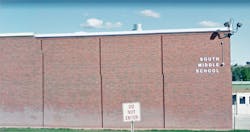Facility plan in Rapid City (S.D.) district calls for building 5 new schools
The Rapid City (S.D.) Area district is considering a massive overhaul of its school facilities by way of a $250 million bond issue.
The Rapid City Journal reports that if the plan is pursued, it would mean constructing schools, closing existing campuses, and redrawing attendance boundaries.
"We must have this conversation, and I understand that it's not going to be an easy conversation," says Superintendent Lori Simon. I know that there are going to be some great supporters out there, and I know that there are going to be people that don't want to see their taxes raised. But it's time, and we really must do something about our facilities, because doing nothing is not an option."
The school board must vote on whether to put a bond proposal before voters. Residents have not been asked to support a school bond issue in more than 45 years.
Faced with an increasing student ernollment, a lack of space, and aging and deteriorating facilities, the district formed a task force of administrators, board members and residents to craft a 10-year facilities plan.
School Board President Ron Riherd, a member of the task force, says no other board members have voiced opposition to the proposal at this point.
"We really don’t have any choice," Rihert says. "We've got to do something, and the most intelligent thing we can do is try and get this bond issue passed."
The first phase of task force's plan calls for building three new elementary schools and shuttering three existing schools. Two middle schools, South and West, would both be rebuilt where they stand.
That plan puts the cost of building the new facilities at $180 million. Renovating four middle and two high schools to add space for computer labs, open classrooms and security features would cost another $70 million.
As part of a proposed $22 million renovation, Stevens High School would receive a new fine arts wing in place of its existing one. Safety and security concerns, Simon said, as well as lapses in Americans with Disabilities Act compliance need to be addressed.
Renovations of Pinedale, Meadowbrook, Knollwood and Black Hawk elementary schools are projected to cost a total of $15 million.
Finally, the bond would provide $30 million to address deferred maintenance.
Paying new schools without a bond election is not viable, Simon says.
"The small amount that we have in capital outlay funds only allows us to build a new building about once every 10 years, so the math just does not add up," she says.
Because the facilities plan is only preliminary, the task force is seeking input from residents through a series of planned town hall-style meetings.
A final recommendation from the task force is expected to be presented to the school board in June.
About the Author
Mike Kennedy
Senior Editor
Mike Kennedy, senior editor, has written for AS&U on a wide range of educational issues since 1999.
